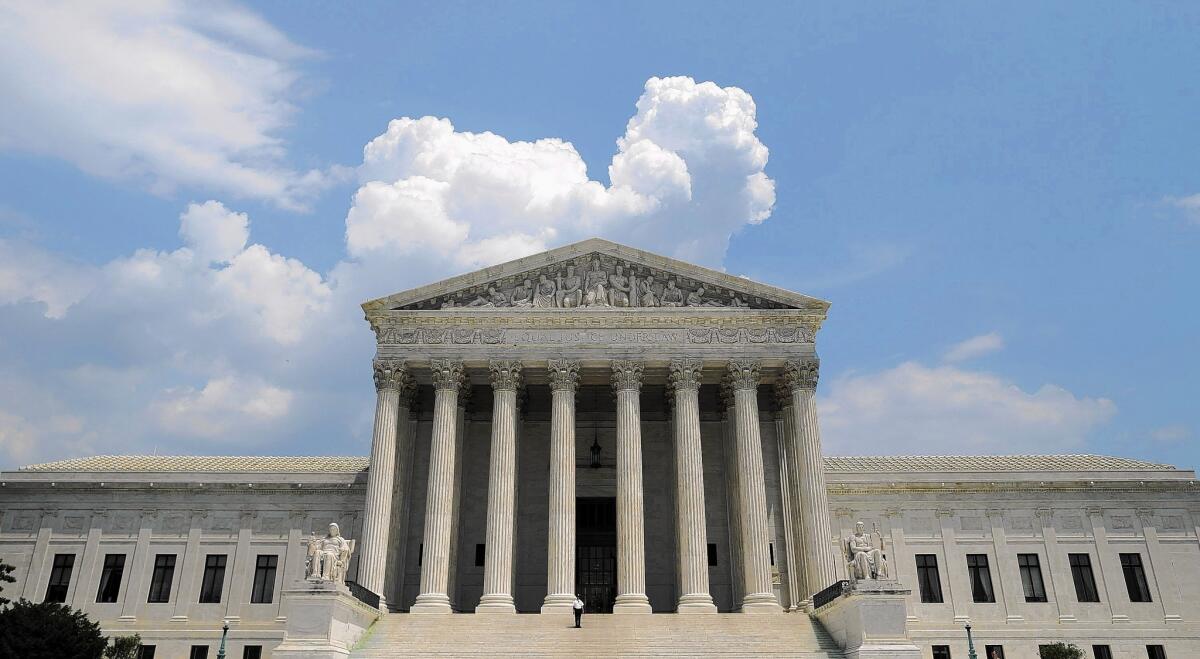Opinion: Supreme Court shouldnât have punted on Trumpâs census order

Too soon. Thatâs the upshot of the Supreme Courtâs decision Friday morning in a legal challenge to the Trump administrationâs effort to subtract estimates of immigrants lacking legal status from the census counts that will be used to determine how many seats each state will get in the House of Representatives.
And while there may have been a legal reason for punting, it was still the wrong decision, as Justice Stephen G. Breyer pointed out in a dissent signed by the courtâs other two remaining liberals, Justices Sonia Sotomayor and Elena Kagan.
Obama, Kamala Harris are children of immigrants. Would voters elect a descendant of American slaves?
Are âelevated minoritiesâ like Barack Obama and Kamala Harris the only Black people America is willing to put in charge?
âThe Government has announced a policy to exclude aliens without lawful status from the apportionment base for the decennial census. The Government does not deny that, if carried out, the policy will harm the plaintiffs,â Breyer wrote. âThe Governmentâs effort to remove them from the apportionment base is unlawful, and I believe this Court should say so.â
The legal challenge by civil liberties groups and some state governments, led by New York, argued that Trumpâs executive order to, in essence, cook the books, violated the constitutional mandate that the decennial census count everyone living in the country at the time, which over time has been understood to mean, well, everyone, with a few carve-outs for diplomats, tourists and the like.
Notably, legal status is not mentioned in the Constitution.
But the numbers have yet to be finalized by the Census Bureau and have not been presented to the president, so, in the court majorityâs nondecision, no harm, no foul.
âAt present, this case is riddled with contingencies and speculation that impede judicial review,â the court majority said in the unsigned decision. âThe President, to be sure, has made clear his desire to exclude aliens without lawful status from the apportionment base. But the President qualified his directive by providing that the Secretary should gather information âto the extent practicableâ and that aliens should be excluded âto the extent feasible.â Any prediction how the Executive Branch might eventually implement this general statement of policy is âno more than conjectureâ at this time.â
Reckoning with the social and racial inequities of the justice system also means confronting the unjust and inhumane nature of capital punishment.
But how the Trump administration might implement this presidential edict is of less significance than the fact that the president ordered the stripped-down count in the first place. That was the overstep here, and that is what the court should have ruled on.
There are a couple of silver linings to this, though.
âThis Supreme Court decision is only about timing, not the merits,â said Dale Ho, director of the American Civil Liberties Unionâs Voting Rights Project, who argued the case before the court. âThis ruling does not authorize President Trumpâs goal of excluding undocumented immigrants from the census count used to apportion the House of Representatives. The legal mandate is clear â every single person counts in the census, and every single person is represented in Congress. If this policy is ever actually implemented, weâll be right back in court challenging it.â
The other silver lining: The Census Bureau has said that problems reconciling the data means that it likely will not be able to file its report with the president until Jan. 26, or maybe not even until sometime in February.
By then, President Trump will be fighting with his Florida neighbors over whether he can live at Mar-a-Lago, and President Joe Biden, who opposes Trumpâs order, will be the one receiving the numbers. And he can easily undo the damage Trump is trying to cause by accepting the total numbers â as the Constitution calls for.
More to Read
A cure for the common opinion
Get thought-provoking perspectives with our weekly newsletter.
You may occasionally receive promotional content from the Los Angeles Times.












